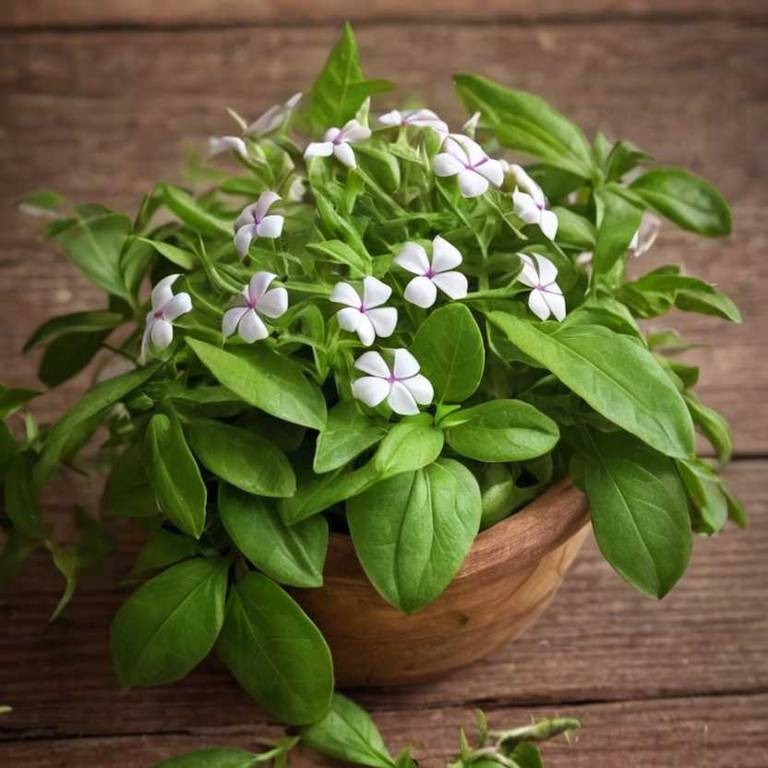By Leen Randell
Updated: Jul 07, 2024
What Are The Medicinal Properties Of Catharanthus Roseus (Madagascar Periwinkle)?

Catharanthus roseus, also known as Madagascar periwinkle, has health benefits such as the treatment of childhood leukemia and Hodgkin's lymphoma.
The medicinal constituents of this herb include vincristine and vinblastine, alkaloids that inhibit cell division and induce apoptosis. These compounds are often extracted and formulated into medicinal preparations, including injectable solutions and oral medications. However, catharanthus roseus can cause side effects such as gastrointestinal disturbances and bone marrow suppression.
Caution should be exercised when using this herb, particularly in large doses or for prolonged periods.
This article explains the health benefits, active constituents, medicinal preparations, possible side effects, and precautions related to Catharanthus roseus.
- What are the health benefits of Catharanthus roseus?
- What are the active constituents of Catharanthus roseus?
- What are the medicinal preparations of Catharanthus roseus?
- What are the possible side effect of using Catharanthus roseus improperly?
- What precautions to take when using Catharanthus roseus medicinally?
What are the health benefits of Catharanthus roseus?
Catharanthus roseus, also known as Madagascar periwinkle, has health benefits such as boosting immunity, reducing inflammation, and exhibiting antiviral properties.
Studies have shown that the plant contains bioactive compounds like alkaloids and glycosides, which may help combat certain diseases like cancer and malaria.
Additionally, its extracts have been found to exhibit antioxidant and antimicrobial activities, supporting its potential use in traditional medicine for various ailments.
Here's a detailed article about the 10 health benefits of Catharanthus roseus.
What are the active constituents of Catharanthus roseus?
Catharanthus roseus, also known as Madagascar periwinkle, has active constituents such as vinblastine and vincristine, which are alkaloids that exhibit anti-tumor and anti-cancer properties.
Vinca alkaloids also possess anti-inflammatory and immunosuppressive properties, making the plant a valuable source of medicinal compounds. Additionally, the plant contains other bioactive compounds, including terpenoids and iridoids, which have been studied for their potential in treating various health conditions.
These constituents contribute to the plant's medicinal significance.
Here's a detailed article about the 10 active constituents of Catharanthus roseus.
What are the medicinal preparations of Catharanthus roseus?
Catharanthus roseus, also known as Madagascar periwinkle, has medicinal preparations such as vinblastine and vincristine, alkaloids derived from its leaves and stems.
These compounds are used to treat various types of cancer, including Hodgkin's lymphoma and childhood leukemia.
The plant also contains other alkaloids, such as leurosine and catharanthine, which have antimalarial properties.
Here's a detailed article about the 10 medicinal preparations of Catharanthus roseus.
What are the possible side effect of using Catharanthus roseus improperly?
Improper use of Catharanthus roseus, also known as madagascar periwinkle, increases the chances of experiencing side effects such as nausea, vomiting, and diarrhea.
It can also cause irregular heartbeat, low blood pressure, and weakness. In severe cases, the use of madagascar periwinkle can lead to cardiac arrest and respiratory failure. Long-term consumption can damage the heart, liver, and kidneys.
It is essential to consult a medical professional before using this plant for medicinal purposes.
Here's a detailed article about the 10 most common side effects of Catharanthus roseus.
What precautions to take when using Catharanthus roseus medicinally?
Before using Catharanthus roseus, also known as Madagascar periwinkle, for medicinal purposes, you must take precautions such as wearing gloves to prevent skin contact, as the plant's leaves and roots contain toxic compounds.
Additionally, avoid ingesting any part of the plant, as this can lead to cardiac toxicity.
Pregnant and breastfeeding women, as well as children, should avoid handling the plant altogether due to its potential toxicity.
Here's a detailed article about 10 precautions to take when using Catharanthus roseus.